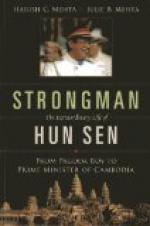He goes to bat at a critical juncture in the game. The score is close. He as much as anyone would like to have runs to his credit. But for the sake of the team his chief concern must be to advance the base runner. So he plays carefully rather than spectacularly, and makes a bunt or a sacrifice hit, with the practical certainty that he will be put out at first base, but with a good probability that he will thus have advanced his fellow one base and so have contributed to the team’s success.
The religious value of the principle here involved receives no little attention in sermon and Sunday-school class, but how tame and formal is its verbal presentation as compared with its registration in the very will and muscles of a boy at play! Wherever a state has become great or a cause victorious, wherever a hero—a Socrates or a Christ—has appeared among men, there has been the willingness, when necessary, to make the “sacrifice hit.” The loyalty that has held itself ready so to serve on moral demand has to its credit all the higher attainments of humanity.
In the great American experiment of democracy, where the welfare of the people is so often bartered for gold, and where public office is frequently prostituted to private gain, there is a proportionately great need of teaching in every possible way this fundamental virtue of loyalty. Our future will be secure only in the degree in which intelligent and strong men are devoted to the welfare of city and state after the fashion of the boy to his team. It is because war, with all its horrors, has stimulated and exhibited this virtue that its glory persists far into our industrial age; and the hope of a lofty patriotism, that shall be equal to the enervating influences of peace, lies in an educated and self-denying type of loyalty.
The use of this loyalty in the reformation of boy criminals has been remarkably demonstrated in the well-known work of Judge Ben B. Lindsey, of Denver. In a particularly difficult case he says:
I decided to put my influence over him to the test. I told him of the fight I was making for him, showed him how I had been spending all my spare time “trying to straighten things out” for him and Heimel, and warned him that the police did not believe I could succeed. “Now, Lee,” I said, “you can run away if you want to, and prove me a liar to the cops. But I want to help you and I want you to stand by me. I want you to trust me, and I want you to go back to the jail there, and let me do the best I can.” He went, and he went alone—unguarded.
Here is a striking example of the team work of two with the play upon loyalty and the spirit of contest.




